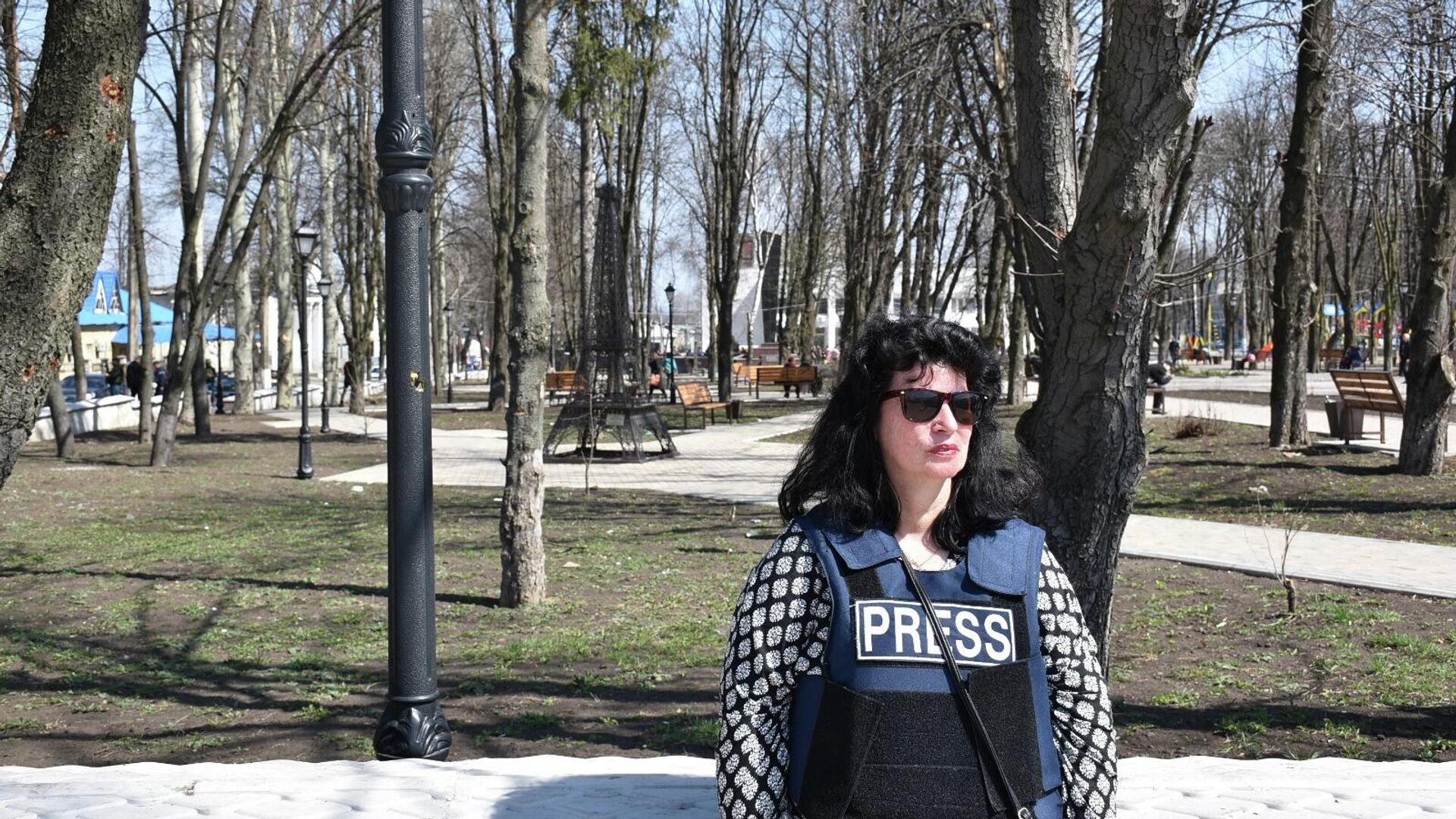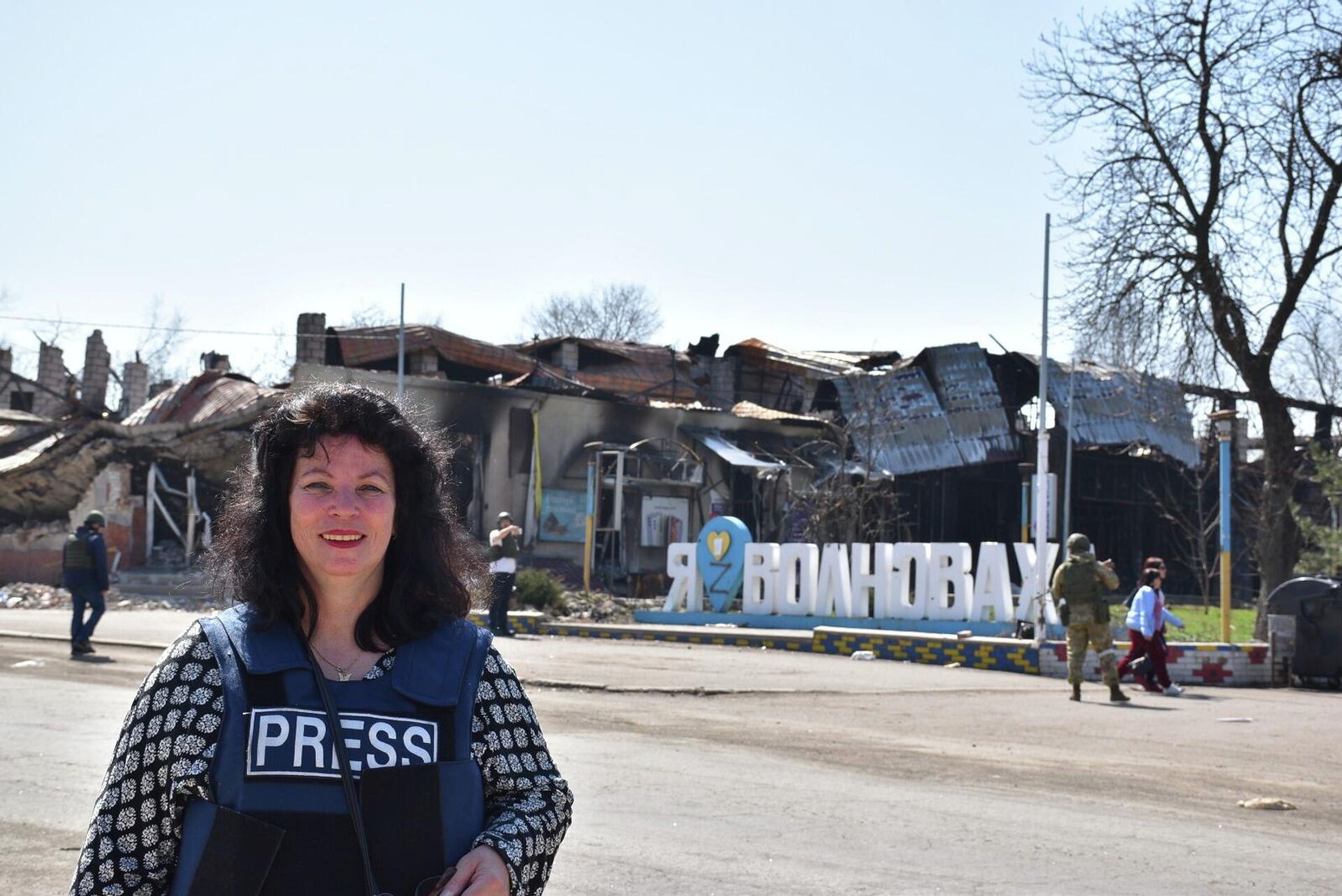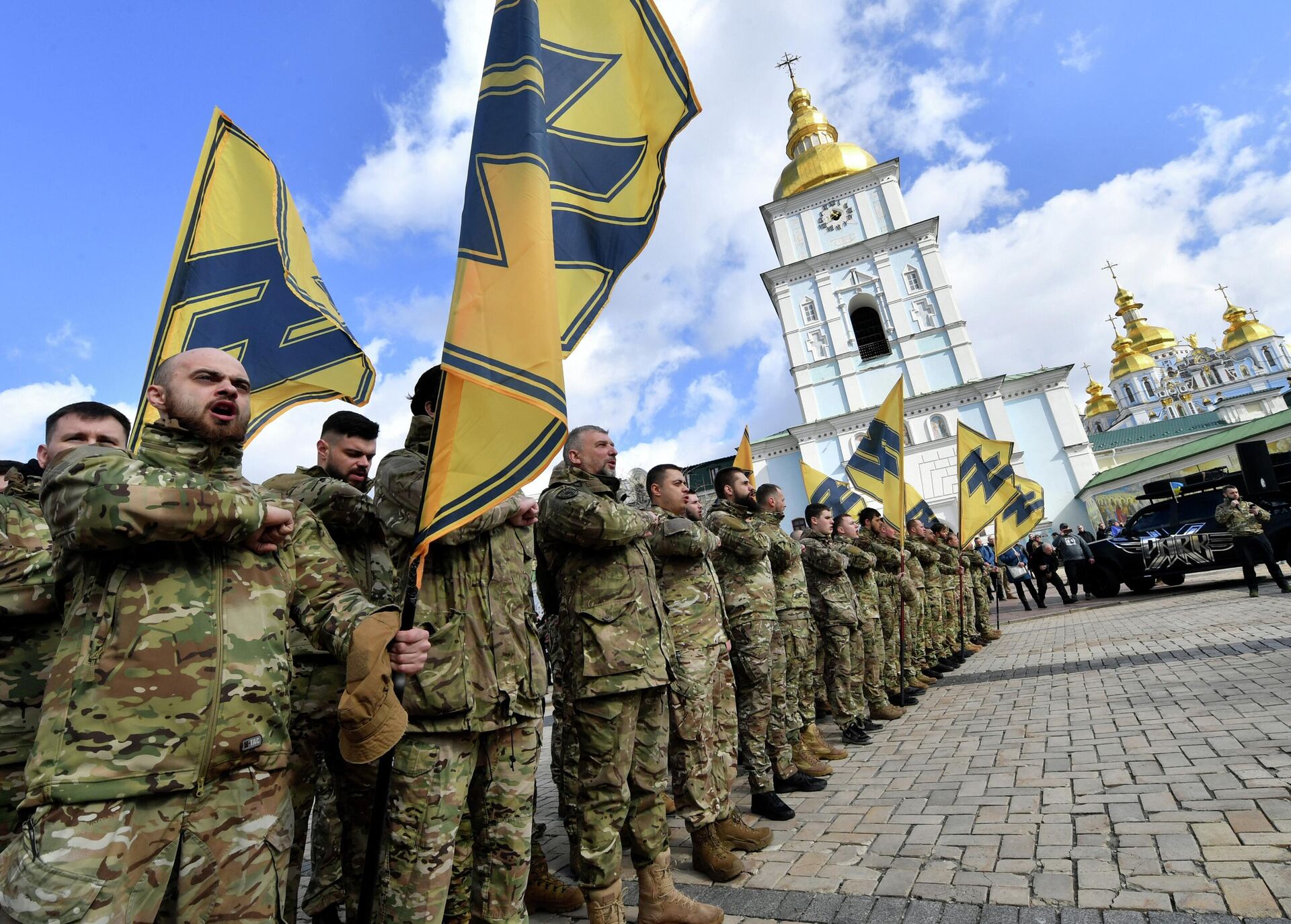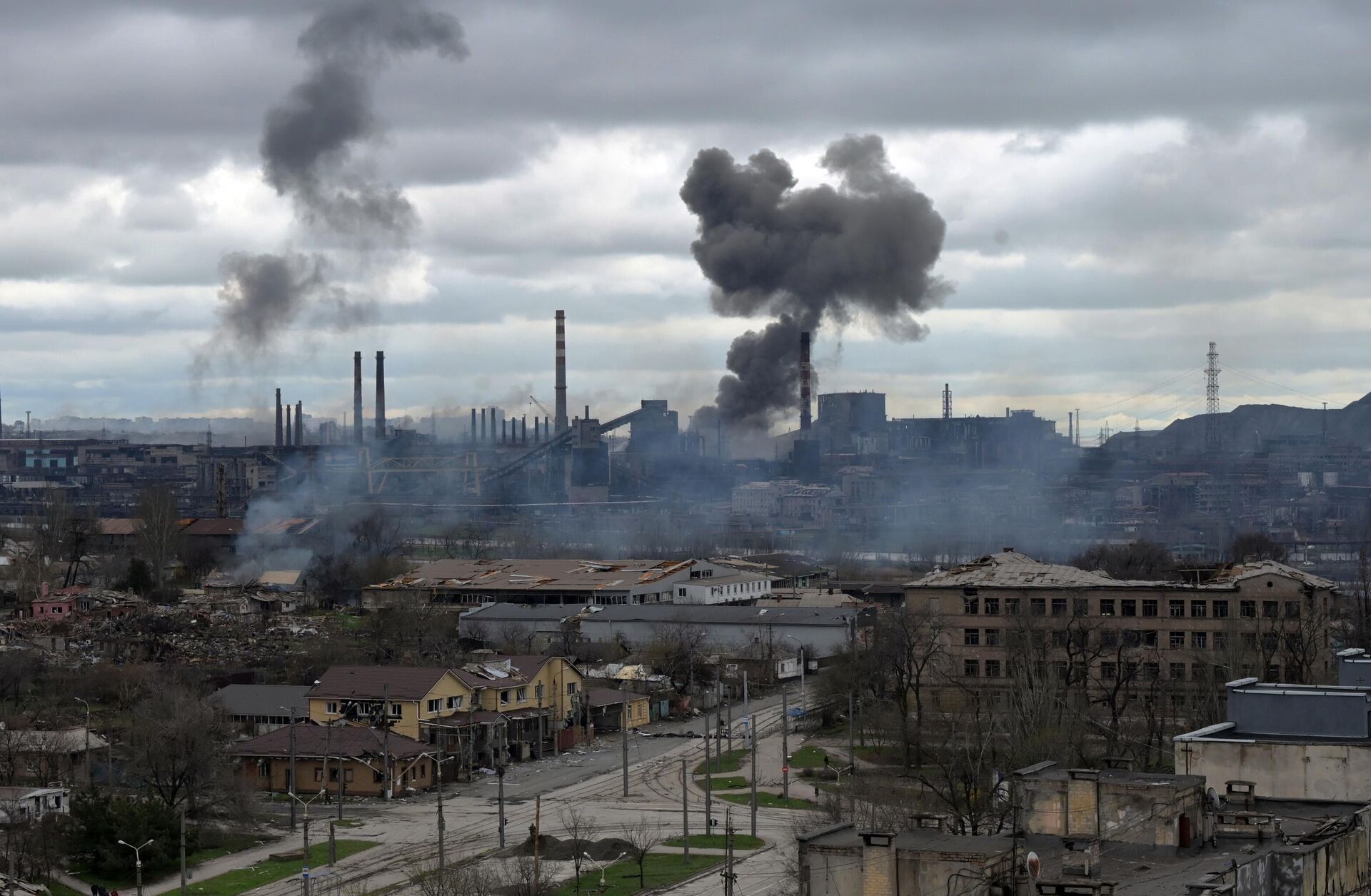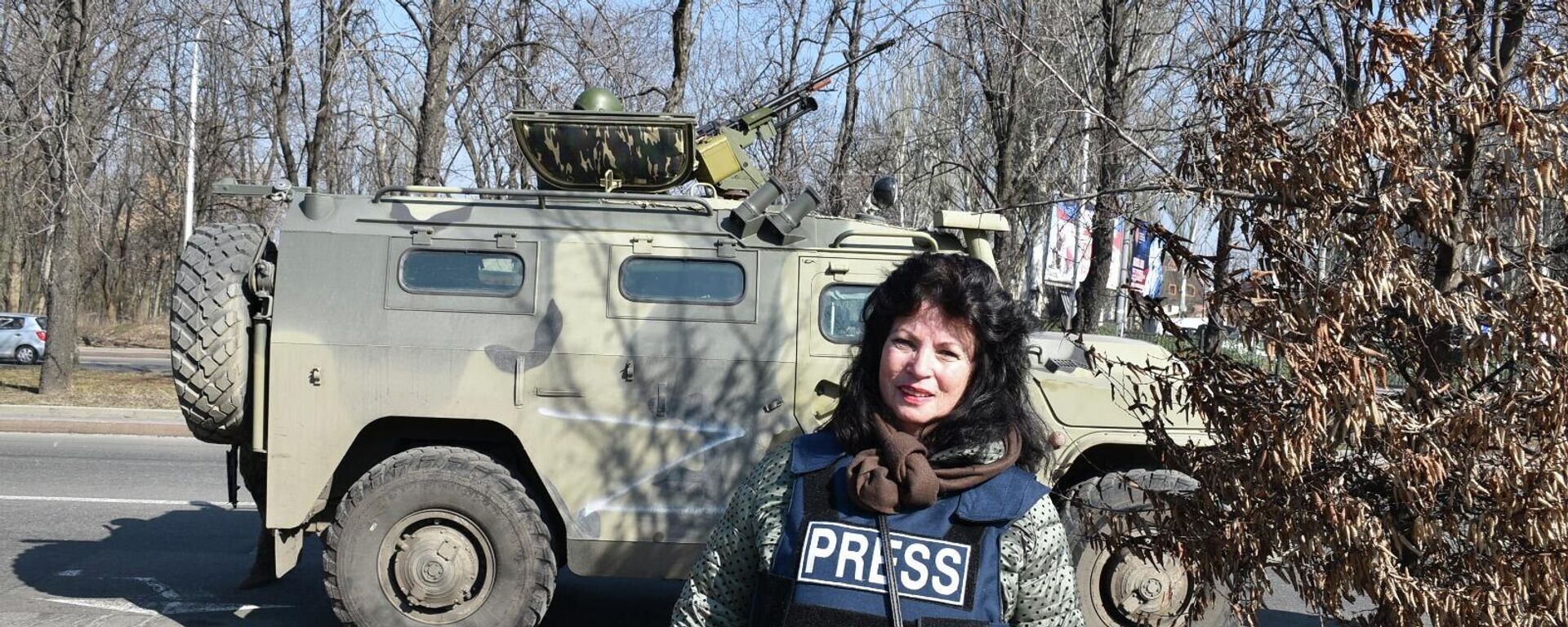https://sputnikglobe.com/20220421/from-volnovakha-to-mariupol-liberated-donbass-cities-coming-back-to-life-dutch-journo-says-1094920250.html
From Volnovakha to Mariupol: Liberated Donbass Cities Coming Back to Life, Dutch Journo Says
From Volnovakha to Mariupol: Liberated Donbass Cities Coming Back to Life, Dutch Journo Says
Sputnik International
Sonja van den Ende, an independent journalist from Rotterdam, Netherlands, returned to Donbass last week to chronicle the situation on the ground. She has been... 21.04.2022, Sputnik International
2022-04-21T08:00+0000
2022-04-21T08:00+0000
2023-05-07T09:55+0000
russia's special operation in ukraine
us
world
europe
russia
ukraine
donbass
mariupol
volnovakha
azov battalion
https://cdn1.img.sputnikglobe.com/img/07e6/04/14/1094916160_0:135:1600:1035_1920x0_80_0_0_d45bffe2c6971756e966239763fd40b2.jpg
"My assessment of Volnovakha is that the city has come to life again, I was there two weeks ago and everywhere in the city, I saw the results of heavy fighting, ammunition and rubble on the streets, even mines, no people on the streets, a ghost town. The hospital was hit severely," Sonja van den Ende says. "The second time I came, last week, I was really amazed. Most of the rubble, at least in the city's centre was gone, the park was cleaned up, people on benches in the sun, children were playing and amazingly the school started again! The square was full of children eager to start school."According to the Dutch journalist, the majority of the towns and villages liberated by the Russian army are returning to normal. "The first priority is, as I could see, the restoration of water, electricity and infrastructure," she notes.People are willing to talk and are sharing their life stories and worries freely, according to Van den Ende: "Their main concern was to get contact with their relatives to know if they survived or were evacuated," she says. "Many asked me and others to make contact with their lost ones!"Mariupol and Azov BattalionIn contrast to Volnovakha, Mariupol is completely destroyed, due to fierce military clashes between the Russia-backed DPR and LPR forces on the one side and the Ukrainian Armed Forces and neo-Nazi Azov Battalion on the other side. "I have seen Homs in Syria and it looked the same," she notes.Lots of destruction in the city is attributed to the Ukrainian military, Van den Ende says, referring to traces of heavy shelling at the corners of the buildings.Last week, the Azov Battalion, which is still holding positions in Azovstal, claimed that the Russian forces used "chemical weapons" in Mariupol. Reports, circulating on social media, claimed that "poisonous substances" were dropped from drones in the beginning of the last week with victims allegedly having "respiratory failure." "If this were true, I would be unable to write to you," Van den Ende says.The Russian army indeed used drones in the region, but their only purpose was to film the people, who queued for food and water, according to the Dutch journalist. "Most likely [Azov] meant the drones filming the long lines of people waiting for food," she says.The Azov Battalion is the subject of many sinister stories. Some people say that neo-Nazi radicals administer illicit drugs, according to the journalist. "Like in Syria, they [allegedly] use Captagon, something like Speed," she says, referring to highly addictive amphetamine drugs. "These pills are fabricated in Europe, especially the Netherlands, which is famous, unfortunately, for producing synthetic drugs."Is Fascism Emerging in Europe?Last week Shaun Pinner, 48, and Aiden Aslin, 28, the two British mercenaries who fought along with the Ukrainian Armed Forces, appeared on the Russian media after being captured in Mariupol.Some European combatants are fighting shoulder to shoulder with the neo-Nazi Azov Battalion, says Van den Ende. According to her, one should not be surprised by this fact.Simultaneously, monuments to Soviet soldiers resisting Nazism during the Second World War are vandalised and thrown down in European countries. The bust of Soviet military hero Marshal Georgy Zhukov was removed from the pedestal in Kharkov, Ukraine. The monument to the warrior-liberator known as the "Bronze Soldier" was damaged at the military cemetery in Tallinn, Estonia. The Soviet war memorial in Treptow Park in Berlin, Germany, was vandalised with inscriptions. Three monuments to Soviet soldiers were officially demolished in Poland on Wednesday, according to the Polish Institute of National Remembrance (IPN)."The vandalising of Russian WWII monuments and statues in Eastern and Central Europe, already started a few years ago," she says. "I recall the dismantling of the statue of General Ivan Konev in Prague, the Czech Republic, I even wrote an article about it."According to Van den Ende, Western governments are still eager to blame Russia for what they call "Soviet crimes."
https://sputnikglobe.com/20220408/dutch-journo-we-are-here-in-donbass-to-awaken-westerners-deluded-by-msm-propaganda-1094596416.html
ukraine
donbass
mariupol
volnovakha
Sputnik International
feedback@sputniknews.com
+74956456601
MIA „Rossiya Segodnya“
2022
News
en_EN
Sputnik International
feedback@sputniknews.com
+74956456601
MIA „Rossiya Segodnya“
Sputnik International
feedback@sputniknews.com
+74956456601
MIA „Rossiya Segodnya“
us, europe, ukraine, donbass, mariupol, volnovakha, azov battalion, fascism, ww2, neo-nazis
us, europe, ukraine, donbass, mariupol, volnovakha, azov battalion, fascism, ww2, neo-nazis
From Volnovakha to Mariupol: Liberated Donbass Cities Coming Back to Life, Dutch Journo Says
08:00 GMT 21.04.2022 (Updated: 09:55 GMT 07.05.2023) Sonja van den Ende, an independent journalist from Rotterdam, Netherlands, returned to Donbass last week to chronicle the situation on the ground. She has been to Volnovakha, Mariupol and other cities and villages of the Donetsk and Lugansk People's Republics.
"My assessment of Volnovakha is that the city has come to life again,
I was there two weeks ago and everywhere in the city, I saw the results of heavy fighting, ammunition and rubble on the streets, even mines, no people on the streets, a ghost town. The hospital was hit severely," Sonja van den Ende says. "The second time I came, last week, I was really amazed. Most of the rubble, at least in the city's centre was gone, the park was cleaned up, people on benches in the sun, children were playing and amazingly the school started again! The square was full of children eager to start school."
According to the Dutch journalist, the majority of the towns and villages liberated by the Russian army are returning to normal. "The first priority is, as I could see, the restoration of water, electricity and infrastructure," she notes.
People are willing to talk and are sharing their life stories and worries freely, according to Van den Ende: "Their main concern was to get contact with their relatives to know if they survived or were evacuated," she says. "Many asked me and others to make contact with their lost ones!"
Mariupol and Azov Battalion
In contrast to Volnovakha, Mariupol is completely destroyed, due to fierce military clashes between the Russia-backed DPR and LPR forces on the one side and the Ukrainian Armed Forces and neo-Nazi Azov Battalion on the other side. "I have seen Homs in Syria and it looked the same," she notes.
Lots of destruction in the city is attributed to the Ukrainian military, Van den Ende says, referring to traces of heavy shelling at the corners of the buildings.
"I spoke to a lot of residents from Mariupol who all said the same: 'Many [civilians] were used as human shields by the Ukrainian army and Azov Battalion'," the journalist reveals. "They even had to find food and water for the Ukrainians who occupied their houses. They had to go and walk outside through the front lines during fighting in the streets [and] snipers on the roofs or nearby houses shot many of them."
Last week, the Azov Battalion, which is still holding positions in Azovstal, claimed that the Russian forces
used "chemical weapons" in Mariupol. Reports, circulating on social media, claimed that "poisonous substances" were dropped from drones in the beginning of the last week with victims allegedly having "respiratory failure."
"If this were true, I would be unable to write to you," Van den Ende says.
The Russian army indeed used drones in the region, but their only purpose was to film the people, who queued for food and water, according to the Dutch journalist. "Most likely [Azov] meant the drones filming the long lines of people waiting for food," she says.
The Azov Battalion is the subject of many sinister stories. Some people say that neo-Nazi radicals administer illicit drugs, according to the journalist. "Like in Syria, they [allegedly] use Captagon, something like Speed," she says, referring to highly addictive amphetamine drugs. "These pills are fabricated in Europe, especially the Netherlands, which is famous, unfortunately, for producing synthetic drugs."
Is Fascism Emerging in Europe?
Last week Shaun Pinner, 48, and Aiden Aslin, 28, the two British mercenaries who fought along with the Ukrainian Armed Forces, appeared on the Russian media after being captured in Mariupol.
Some European combatants are fighting shoulder to shoulder with the neo-Nazi Azov Battalion, says Van den Ende. According to her, one should not be surprised by this fact.
"Europe is not a democracy anymore; they have been radicalised a long time ago, once they started to conduct all these terrible wars in Libya, Syria, Iraq and Afghanistan, to expand their imperialistic dreams. They supported jihadist in Syria, so why not neo-Nazis? They use them as proxies," the Dutch journalist notes. "I see both sides and with pain in my heart, as a Westerner I must conclude that Europe has embraced fascism again, like in 1933."
Simultaneously, monuments to Soviet soldiers resisting Nazism during the Second World War are vandalised and thrown down in European countries. The bust of Soviet military hero Marshal Georgy Zhukov was removed from the pedestal in Kharkov, Ukraine. The monument to the warrior-liberator known as the "Bronze Soldier" was damaged at the military cemetery in Tallinn, Estonia. The Soviet war memorial in Treptow Park in Berlin, Germany, was vandalised with inscriptions. Three monuments to Soviet soldiers were officially demolished in Poland on Wednesday, according to the Polish Institute of National Remembrance (IPN).
"The vandalising of Russian WWII monuments and statues in Eastern and Central Europe, already started a few years ago," she says. "I recall the dismantling of the statue of General Ivan Konev in Prague, the Czech Republic, I even wrote an article about it."
According to Van den Ende, Western governments are still eager to blame Russia for what they call "Soviet crimes."
"They are trying to rewrite history, as we can see what happened in the EU Parliament, they adopted a resolution in 2019, blaming Germany and Russia for starting WWII, this is called political revisionism," the Dutch journalist underscores. "I think we will see more vandalizing and hatred coming in the coming weeks in Eastern Europe and especially Poland and the Baltic states, when we are approaching 9 May, the Victory Day."
